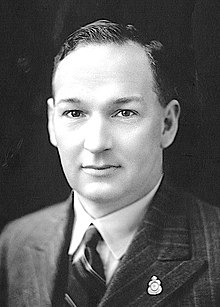Sir Thomas Playford
|
The Honourable Sir Tom Playford GCMG |
|
|---|---|
 |
|
| 33rd Premier of South Australia Elections: 1941, 1944, 1947, 1950, 1953, 1956, 1959, 1962, 1965 |
|
|
In office 5 November 1938 – 10 March 1965 |
|
| Monarch |
George VI Elizabeth II |
| Governor |
Lord Dugan Sir Malcolm Barclay-Harvey Lord Norrie Sir Robert George Sir Edric Bastyan |
| Preceded by | Richard Layton Butler |
| Succeeded by | Frank Walsh |
| 26th Leader of the Opposition (SA) | |
|
In office 10 March 1965 – 1966 |
|
| Preceded by | Frank Walsh |
| Succeeded by | Steele Hall |
| Treasurer of South Australia | |
|
In office 5 November 1938 – 10 March 1965 |
|
| Premier | Thomas Playford IV |
| Preceded by | Richard Layton Butler |
| Succeeded by | Frank Walsh |
| Member for Gumeracha | |
|
In office 19 March 1938 – 2 March 1968 |
|
| Preceded by | Constituency Created |
| Succeeded by | Bryant Giles |
| Member for Murray | |
|
In office 8 April 1933 – 19 March 1938 |
|
| Preceded by | Robert Hunter |
| Succeeded by | Constituency Abolished |
| Personal details | |
| Born | 5 July 1896 Norton Summit, South Australia, Australia |
| Died | 16 June 1981 (aged 84) Adelaide, South Australia, Australia |
| Nationality | Australian |
| Political party | Liberal and Country League |
| Spouse(s) | Lorna Playford (née Clark) |
| Profession | Politician |
| Religion | Baptist |
Sir Thomas Playford GCMG (5 July 1896 – 16 June 1981) was a South Australian politician. He served continuously as Premier of South Australia and leader of the Liberal and Country League from 5 November 1938 to 10 March 1965. Though controversial, it was the longest term of any elected government leader in the history of Australia, or indeed of anywhere under the Westminster system. His tenure as premier was marked by a period of population and economic growth unmatched by any other Australian state. He was known for his parochial style in pushing South Australia's interests, and was known for his ability to secure a disproportionate share of federal funding for the state as well as his shameless haranguing of federal leaders. His string of election wins was enabled by a system of a malapportionment gerrymander that bore his name, the 'Playmander' − which saw the Australian Labor Party win clear majorities of the statewide two-party vote whilst failing to form government in 1944, 1953, 1962 and 1968.
Born into an old political family, Playford was the fifth Thomas Playford and the fourth to have lived in South Australia; his grandfather Thomas Playford II had served as premier in the 19th century. He grew up on the family farm in Norton Summit before enlisting in the Australian Imperial Force in World War I, fighting in Gallipoli and Western Europe. After serving, he continued farming until his election as a Liberal and Country League (LCL) representative for Murray at the 1933 state election. In his early years in politics, Playford was an outspoken backbencher who often lambasted LCL colleagues and ministers and their policies, and had a maverick strategy, often defying party norms and advocating unadulterated laissez faire economics and opposing protectionism and government investment, in stark contrast to his later actions as premier. With the resignation of the LCL's leader, Richard Layton Butler, Playford ascended to the premiership in 1938, having been made a minister just months earlier in an attempt to dampen his insubordination. Playford inherited a minority government and many independents to deal with, and instability was expected; Playford was seen as a transitional leader. However, Playford dealt with the independents adroitly and went on to secure a one-seat majority at the next election.
...
Wikipedia
